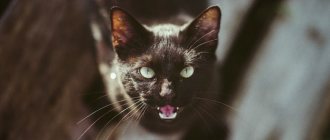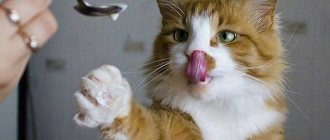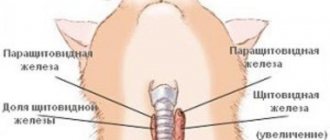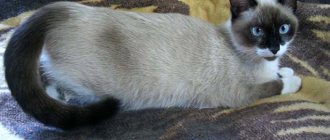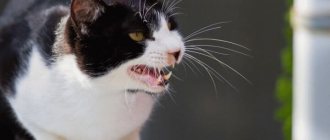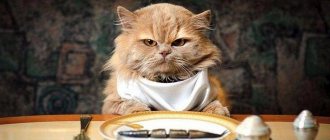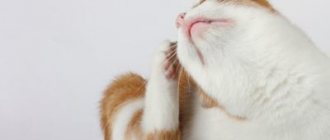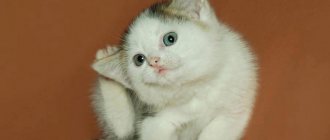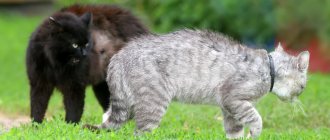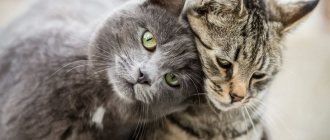While some cats suffer from decreased appetite, others have the opposite problem. An eternally hungry cat is a common occurrence. Owners observe how their pets require more than the permitted dose of dry food per day or natural food of more than 5-7% of body weight, that is, more than the average daily norm. Why is this happening? Is it necessary to supplement feeding if a hungry cat constantly asks for food? The answer depends on each specific situation. Here are some examples of reader questions on this topic.
Situation 1: a hungry cat does not eat up natural food; previously drying was always available
“My cat, until she was 2 years old, ate only dry food; it was always available. Now we have switched her to natural food twice a day and cannot feed her: she constantly asks for food throughout the day. Why does a cat always want to eat?
Over the course of 2 years, the cat got used to a diet where food was available all the time. Now she is limited to two meals, which is unusual for her and can even cause stress. Naturally, it is inappropriate to keep natural food available at all times; such nutrition requires 2-3 meals a day. However, the cat needs time to readjust. This takes from 1 to 3 months. At this time, if possible, you can divide the daily portion into 3 meals instead of two, and then, when the cat gets used to this regimen, remove the daily meal, again dividing it between breakfast and dinner. If it is not possible to feed three times a day, you will just have to wait until the body readjusts.
Article continues after advertisement
Situation 2: the cat does not get enough of two meals a day, previously he ate food twice a day
“My cat wants to eat all the time. The feeling that he simply does not get enough of natural food. When I was at the stern, I ate twice a day and didn’t ask for extra. Now he follows me around all day and looks at me with pitiful eyes. He eats 5% of his weight, that is, according to science. Does he really need more? What if he gets fat then? The cat asks for food - does it mean he’s missing something?
Most likely, this condition will pass some time after switching to a natural diet. Many cats are delighted with raw meat, because it is the right food, so at first they try to eat more. In addition, the body also needs to be rebuilt. There is a study that shows that by eating approximately the same food for 2-4 weeks, the cat gets used to it - and its body learns to regulate activity in accordance with the amount of energy supplied by the food. At the same time, the body gets used to a certain amount of food and learns to get enough of it. That is, a kind of adjustment of the body to the proposed type of nutrition occurs. The situation usually returns to normal within 1-3 months.
But it’s still worth analyzing the cat’s activity and condition. If you see a lack of body weight (ribs and spine stick out) or the cat is overly active, then perhaps he is missing 5%. Then the amount of food can be increased slightly or made more caloric. Lean pork, chicken heads, and poultry thighs with skin help with this.
If the cat is in normal condition, he is well-fed, and his activity is so-so, in addition, the animal is castrated, which is why it may also feel an excessive appetite, it does not need additional food. Then you can resort to tricks to better saturate your cat with food of the same calorie content. For example, if you serve meat in small or medium-sized pieces, try cutting them larger. When a cat has to try hard to eat the “prey”, work hard with its jaw, it takes longer - then the animal realizes faster that it is full. Similar mechanisms operate in humans. Secondly, active jaw activity is an important element of eating due to a number of neurophysiological reactions, which results in increased levels of happiness and decreased stress.
Behavior problems
When cats ask for a date with a cat, household members have a hard time. The constant screaming makes it impossible to sleep at night. Some people can’t stand it and lock their pets in one of the rooms. Others wet the animal’s fur with water in the evenings. This allows you to gain an hour of silence while the cat licks its fur coat. But as soon as she dries up, she starts asking for the cat again. This behavior is exhausting and forces you to try different ways.
Is it possible to calm a cat at home?
Simply petting and calming a cat that asks for a cat is unlikely to work. You will have to be patient and wait until the heat ends.
Numerous “folk” tips on how to calm a pet usually turn out to be ineffective:
- Pet your pet more often. Showing attention will only increase arousal.
- Give sedatives. They will not help because the animal is not stressed. They are driven by the instinct of reproduction. Such medications only slightly dull the desire to mate.
- Feed the cat with products containing pheromones like Feliway. During sexual hunting they are completely useless. Such drugs help to quickly adapt to a new place and to endure the trip more calmly, but they do not pacify natural instincts.
Calming medications for cats
Sometimes veterinarians recommend taking sedatives. Such medications help to dull arousal a little, but their main purpose is to achieve mental lability, eliminate aggression and anxiety.
List of drugs and method of use:
- Cat Baiyun. A medicine based on herbs with a sedative effect - valerian roots, oregano, sweet clover, mint, motherwort, hop cones and others. As soon as the cat begins to ask for a cat, she is given 2 ml of medicine three times a day for 5-7 days.
- Fitex drops. A sedative with herbal components – valerian, motherwort, hop extract. The medicine normalizes the functioning of the central nervous system, muffles the feeling of fear and aggression. If a cat wants a cat, or vice versa, then the pet is given 3-5 drops of the product in the morning, lunch and evening for several days.
- Drops for cats Stop stress. The drug is available in the form of drops and tablets. The medicine contains aminophenylbutyric acid and extracts of valerian, catnip, hops and motherwort. This remedy helps reduce agitation and correct the animal's behavior in stressful situations. Directions for use: 1 drop per 1 kg of weight twice a day.
Sedatives should not be given to a cat for a long time. They are allowed to be used for no more than 10 days. And you should not expect that these medications will completely eliminate sexual arousal. They can only slightly smooth out the symptoms of estrus.
Artificial ovulation
Sometimes the safest and most effective way to calm a cat so that she does not ask for a cat is to artificially induce ovulation. This method is suitable if the pet cannot be given for mating right now for some reason. For example, if she is in her first heat or a worthy candidate for mating has not yet been found.
In some cases, veterinarians show owners how to simulate sexual intercourse at home, which will cause ovulation. To do this, you will need a small phallic-shaped object about 4-5 mm thick and 1.5-2 cm long. A cotton swab wrapped in a fingertip or something similar will do. The cat is held by the withers. When she is in the mating position, the object is gently inserted into her vagina.
It is recommended to repeat this procedure 3-4 times within 12 hours. After this, the pet should ovulate, which will provoke a false pregnancy.
The heat will stop, the cat will calm down, stop asking for the cat and will prepare for the appearance of kittens. Some females begin to arrange a place for birth. During a false pregnancy, hormonal changes occur, so milk may be released from the mammary glands.
Attention! The artificial ovulation technique cannot be used every time the cat asks for a cat. This can cause inflammation in the uterus.
What not to do
Some actions of owners can harm the cat. For example, you cannot lock an animal in a cellar or bathroom. Being alone will have a negative impact on your mental health.
It is also undesirable to let your cat outside unattended, because it could get hit by a car, contract a virus, or become a victim of aggressive dogs. In addition, uncontrolled walking during estrus can lead to mating with an outdoor cat.
You should not punish her, yell at her, or hit her. This will not help solve the problem, because the animal is at the mercy of instincts. The pet will still continue to scream and roll on the floor.
Situation 3: the cat does not eat enough after changing food
“After the operation to remove the testicles, we switched the cat to castrate food, because this is considered correct. However, now he asks for food all the time. As soon as we return the old food, everything returns to normal, but we understand that we cannot feed it, because... castrati are prone to obesity. Why does the cat constantly ask for food? What to do?"
In fact, not all castrates gain weight after having their testicles removed. Many people do not even experience increased appetite, although this is rare. Feeding them regular food, not for castrati, is quite possible and, rather, even necessary. We discussed this situation in detail in another publication.
The cat is constantly begging for food
Quite often cats and kittens sin by begging. Even if there is a lot of food in their bowl. And almost every time you approach the refrigerator, you catch the hungry look of cat’s eyes full of reproach and reproach. Often you yourself are to blame for this. Having succumbed to such a pitiful look at least once, the cat’s owner forever becomes a hostage to the beggar.
Ways to combat begging
- Train your willpower. Having realized that they are going to influence you with a plaintive “meow” and an imitation of a hungry look, simply close the refrigerator and at least make an attempt to ignore the sufferer.
- Feed the animal from the common table as little as possible, even if your pet goes on strike and does not eat from its bowl. After a few days, the animal will probably break its voluntary hunger strike and will eat only from its feeder.
- You should not provoke your cat to steal. When leaving home, do not leave anything edible on the table and securely close all refrigerators and food cabinets.
Situation 4: the cat began to eat too much after castration
“After we castrated our Marquis, he had a crazy appetite. He only thinks about food. He asks all the time. I have already improved significantly. We are afraid of obesity. Why does my cat always want to eat? Can I feed him even more or not? The cat is on a natural diet.”
You are right to be afraid of obesity, because if the cat passes on, such a fate is inevitable. On the contrary, a neutered male or female cat has a lower calorie requirement than a non-neutered one. Accordingly, there are no objective reasons for increasing the amount of food. Moreover, castrates, even without taking into account the overeating factor, are more prone to a loose body due to hormonal changes.
Nevertheless, the problem must be solved. The increased appetite of castrates is dictated by hormonal changes: now the cat’s body is guided in the feeling of satiety by whether the stomach is full or not. Therefore, the first possible solution is to add more vegetables to the meat than before, but still within the acceptable limits - 10-15% of the diet. Vegetables are practically not absorbed by the cat’s body, passing through the gastrointestinal tract in transit. However, vegetables immediately after eating give you a feeling of fullness, being a kind of ballast and taking up a lot of space. That is, during one meal, the cat consumes a larger volume of food, but the food does not become more caloric. This, by the way, is the basis of the operating principle of many foods for castrates; however, as a rule, they do not contain vegetables, but a lot of grains, which is cheaper but harmful. Therefore, it is better to prepare a natural menu.
In addition, you can use the trick described above, when the pieces of meat are served in large form, so that they take longer to bite off and take longer to digest. And finally, you can divide the daily portion of food into 3 meals without increasing its volume.
In general, I would like to once again draw your attention to the fact that constant begging is not a reason to open the refrigerator. Obesity is life-threatening, and it will definitely come to an animal that moves little, sleeps a lot and eats in excess.
Article continues after advertisement
Normal feeding frequency and portion sizes
The pet's diet includes store-bought dry or wet food, as well as natural food. The serving size depends on the age of the pets and their activity.
For kittens
Kittens need to eat frequently for normal growth and development. However, the volume of the portion received should be small so that the baby has time to digest the food received.
An excess of food or, conversely, a lack of it leads to disturbances in the formation of the body. Digestive disorders, obesity or nutritional deficiencies may occur. The frequency of feeding a kitten depends on its age. At the beginning of complementary feeding - 5 times, gradually the owner should reduce the frequency of feedings to 2-3 times by 6 months.
The volume of the daily portion of dry food depends on the age of the baby. So, at the age of 1-2 months, it will be enough for a pet to eat from 30 to 50 g of store-bought food per day. From 2 to 4 months, the kitten is given 40-65 g, from 4 to 6 months - 55-70 g. From six months of age, the norm of dry food reaches 60-80 g.
Wet food is also introduced gradually, starting complementary feeding with 120 g per day. Gradually, the volume of canned food or natural food is increased to 250 g by 6 months.
For adults and active animals
Food helps adults stay active and energetic. A properly selected diet should contain the right amount of animal protein, vitamins and microelements.
An adult cat is fed no more than 2-3 times a day. The amount of food depends on the weight of the pet. Dry food is given at the rate of 12-15 g per 1 kg of cat weight. So, a mustache with a body weight of 3 kg should receive about 45 g of “drying”.
Wet food and canned food are given in a volume of 60-70 g per 1 kg of weight, or 5% of the total weight of the animal. The serving size for a 3 kg cat will be 180-210 g.
Natural food for active adult fluffies should consist of meat, cereals, vegetables and dairy products. The main part of the diet is meat and offal. The animal needs to eat up to 30 g of protein products per 1 kg of weight per day. The daily intake of cereals is about 15 g, vegetables – 10 g, fermented milk products – 20 g.
For older people
The nutrition of older cats should support the normal functioning of all organs and systems and not cause digestive disorders. The menu should contain easily digestible food appropriate to the age of the individual.
In terms of the frequency and volume of portions, the diet of an elderly mustache does not differ from that consumed in an active age. If the cat is obese, the daily portion can be reduced by 10-15%.
Situation 5: a pregnant cat constantly asks for food
“Ever since my cat got pregnant, she has been eating a lot. I understand that pregnant women eat more. But how much more? How to calculate the norm?
The situation when a nursing cat constantly asks for food or a pregnant cat is always hungry is quite normal. During this period, all her juices are sucked by the kittens (either in the womb or when they drink their mother's milk). Therefore, pregnant and lactating cats are not limited in food - they themselves regulate the amount they eat.
Why does my cat always ask for food even though he's not hungry?
The desire to snack in individuals of any age is caused by both physiological and psychological reasons. They cannot be ignored, because in advanced cases they lead to the development of chronic nervous conditions.
Competition for food with other pets
Living in the same house with other pets makes you want to be first at the food bowl. Even a mustache that has eaten a hearty meal will not want to give the food left on the plate to its relative. The greedy person will try to be the first to be at the feeder and quickly eat not only her own, but also someone else’s portion.
Eating stress
False hunger is a sign of psychogenic polyphagia, which occurs against the background of eating disorders. An excessive increase in appetite develops due to severe emotional shock. Stress is provoked by various reasons: long separation from the owner, a trip to the veterinarian, change of place of residence.
Lack of attention
Fluffy pets really need care and affection from their adored owner. If the owner ignores the pet’s desire to take him on his lap and caress him, then sooner or later the animal will begin to suffer from lack of attention. Your furry friend will be worried and bored.
To attract the attention of a person, the cat will begin to constantly ask for food. This is not only an opportunity for him to attract the owner, but also a way to cope with stress.
Fear of hunger in street animals
Homeless mustaches survive in very difficult conditions, so they are always in search of food. Even when they find themselves in a family of loving owners, former street animals do not immediately get rid of old habits.
Cats are afraid of hunger, so they too often go to the bowl of food and wait for more - so that they can eat for the future. Individual comrades can stock up by hiding food in different parts of the house.
Situation 6: old cat constantly asks for food
“I have an old cat who is always hungry - what should I do? This didn't happen before. We follow the lead and give more food, but the cat still lost weight.”
The answer to the question of why a cat is always hungry may be advanced age. Firstly, some older cats suffer from senile dementia (although in relation to cats it is more correct to say “cognitive dysfunction”), which is why their eating behavior may be impaired: their appetite can become either reduced or increased.
Secondly, if a cat wants to eat all the time, perhaps she actually wants affection and attention, and she associates food with these pleasant things. As you know, old cats need attention more than young ones.
Also, the reason for increased appetite in old people may be that with age, digestion begins to work sluggishly - and beneficial substances coming from food are absorbed less well. In addition, older cats may have reduced immunity, which results in the active development of worms. Often diabetes, which cats sometimes acquire along with excess body weight, causes increased appetite.
If you see that the cat is hungry all the time, but despite the fact that he is given food, he is losing weight, this is a signal - you need to see a veterinarian. Perhaps the fact is that the worms eat most of the nutrients. Perhaps the body itself does not absorb nutrients properly. Also, thinness with increased appetite occurs due to cancer and other diseases. In any case, you need to make a diagnosis and find out the cause of the increased appetite.
How to keep your pet's weight within normal limits
A veterinarian will help you find out the nutritional norm. In addition, approximate daily allowances for mustaches of different ages and different body weights are indicated on food packages.
Should I limit the amount of food I eat?
Restrictions on the amount of food will only help those pets who suffer from excess weight or food allergies. A special diet is provided for such cats. By adhering to a certain regime, the glutton will restore normal body weight and will be able to lead an active lifestyle. In other cases, restrictions on the volume and frequency of feeding are not correct.
How to tell if your cat is malnourished or obese
An attentive and caring owner always sees when something happens to his pet. Problems with underweight or excess body weight are very visible. Obesity is characterized by low activity, the appearance of fatty deposits and folds. Thinness is noticeable through too sunken sides and a protruding spine.
The owner’s main task is to find out the cause of the pet’s painful condition. It is impossible to do this on your own. Only a veterinarian can make a diagnosis and prescribe treatment.
Situation 7: the cat asks for food, but when you give it, it doesn’t eat
“The cat doesn’t eat, but asks if it hasn’t been given yet. That is, he goes around asking, but as soon as you put food on the plate, he sniffs it, spins around and leaves. But still, he eats twice a day on schedule.”
If the cat is hungry, but does not eat when you offer it, this means that either it does not want to eat, or it was given the wrong thing. The second situation is again a consequence of the fact that the cat doesn’t really want to eat: it is overfed and is eating too much food. And requests for food are nothing more than a sporting interest, a kind of hunting. If a cat is really hungry, she will eat the food that is offered to her (of course, if this food suits her). If the animal receives feeding 2 times a day, you should not give additional food between meals.
Doesn't use the tray
If a cat begins to relieve its natural needs in various places not intended for this, then there may be a number of reasons for this.
- The first reason is that the tray the cat uses is not washed. Cats are animals that are famous for their cleanliness. There are even neat and tidy people who would never use an already dirty tray a second time. In this case, the problem is quite simple to solve. Just clean your cat's litter box often and use litter that eliminates odors. Do not use detergents with a strong smell to wash the tray. For example, such as bleach. Strong and pungent odors in the cat's litter box can cause the animal to have a persistent aversion to the potty. If you are forced to leave your pet alone for 2-3 days, give him another tray. So to speak, in reserve.
- The second reason is that the cat is not satisfied with the new litter. Cats by nature are very conservative animals. And if you are determined to transfer your pet to another filler, then it is better to do it gradually. Each time you fill your cat's litter box, mix in a handful of new litter with the old litter. And each time increase the dose of the new filler.
- The third reason why a cat ignores its toilet may be due to the fact that strangers have appeared on the cat's territory. For example, strangers entered the apartment, or a baby was born in the family where the cat lives. In this case, the animal decides that the threat of losing its territory looms over it and, like many animals in the wild, begins to place its marks.
Or maybe your pet has simply become an adult, sexually mature animal. In this case, the only solution may be castration. It should be done at the age of 10 months. At a later age, castration does not make sense, since the cat will already get used to leaving its marks. And then all you have to do is actually prove who’s boss in the house. Moreover, this will have to be done quite seriously, but of course without assault.
Yelling at an animal is completely useless. But to clearly explain to the cat who is boss here, grab him by the scruff of the neck and hiss in his face. After this, slap him in the face sharply, but not too hard, several times. At the same time, continue to hiss while looking the cat in the eyes. Thus, in cat language, you explain to the cat who is in charge in this territory. If after such a “conversation” the animal runs away to another room, you can celebrate your victory - this territory is yours!
In addition, you will need to drown out the cat's odors with your own. But don't be afraid of anything you might think. To do this, you need to thoroughly wash all the places where the cat left its marks with a strong-smelling detergent and then spray it with your perfume, cologne or deodorant. Such procedures may have to be repeated several more times, since your pet will probably try again to regain its dominance.
Situation 8: we got a second pet - and the first one began to attack food
“We have a cat who has always had a normal appetite, sometimes even a bad one. But as soon as we got a kitten, after about a week the cat began to eat like crazy. Sweeps everything they give. A month has already passed and she has recovered a little. What with her?"
This is a common situation: the feeling of competition encourages the animal to eat more greedily. Often cats begin to eat a lot when under stress or when a new family member, not necessarily even an animal, arrives. In this case, increased appetite can last for several months until the stress passes, or remain forever, because... competition will not go away. The only thing that can be done here is to feed the pets separately, or to provide the old-timer with a higher, secluded place, for example, on a windowsill, and protect him from the newcomer’s attempts to take away the food.
Passion for earthworks
Some cats really like to dig into flower pots. At the same time, cats break or eat the plants and flowers themselves. This problem can also be dealt with. To limit access to the soil in a flower pot, cover the space around the flower with a piece of thick cardboard or thick paper. There should be a hole in the covering for the flower stem, and the covering itself should be sealed with double-sided tape.
The next time you try to dig up the ground, the cat will begin to stick its paw to the tape. Naturally, he will not like this and most likely the animal’s craving for land work will weaken significantly.
To consolidate a lasting effect, leave the flower pot in this state for several weeks. To prevent your cat from eating the plant itself, feed it sprouts of sprouted oats, wheat or other grains. When in nature, cats usually eat grass in order to more conveniently empty their stomachs of hairballs that get there during washing.
Situation 9: the cat just started eating a lot
“What if the cat simply began to eat more dry food than normal? Previously, she was even malnourished, but now the indicated norm on the bag of food for her weight is not enough. Closer to 18 pm the bowl is already empty.”
It also happens that an animal, for no apparent reason, begins to eat more than normal. The condition may be harmless and go away on its own over time. But such behavior can also indicate the presence of a number of diseases of the internal organs. For example, cats with diabetes ask for a lot of food. You especially need to be wary if the cat is losing weight. Pay attention to your pet's food: if it is high-carbohydrate (carbohydrates more than 10%), then your cat is at risk. But the diagnosis must be made by a veterinarian. The sooner treatment is started, the greater the chance of a favorable outcome.
conclusions
Constantly searching for food is normal for cats. If a cat asks to eat or steals, then in most cases this is not because he really needs food for physiological reasons. Asking for food between meals is not a reason to panic and think that the cat is malnourished. On the contrary, if the cat does not ask to eat, this usually means that he has overeaten. But you should be wary if the cat, in addition to increased appetite, has underweight and visible health problems, for example, dull hair and falling out, watery eyes, or something else unusual happens. In this case, you should definitely see a veterinarian.
In general, many cats love to eat, so they constantly beg for food, even if there is no physiological need. This is a kind of hunting: wild brothers hunt mice, and domestic ones, out of sporting interest, can beg food from the owner or steal. Therefore, you need to treat begging calmly, without giving your pet a treat every time he asks.
Rate and share!
In what cases should you contact a veterinarian?
There are situations when the owner should not hesitate to visit the veterinary clinic. Sometimes a cat constantly asks for food because it is suffering from serious illnesses, and hunger is just one of the symptoms. Other warning signs include:
- vomit;
- temperature increase;
- digestive disorders;
- weight loss;
- apathetic state;
- dulling of fur;
- discharge from the eyes or nose.
A sick pet often seeks solitude and tries to dodge the caresses of its owner. Sometimes a suffering mustachioer cannot stand being in bright rooms, trying to crawl under a table or bed. Such signs, along with a feeling of excessive hunger, are symptoms of health problems.

